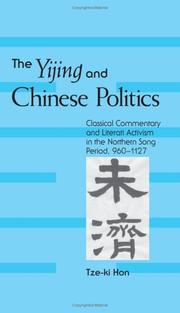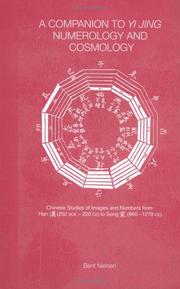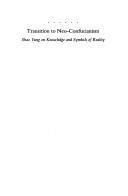| Listing 1 - 10 of 11 | << page >> |
Sort by
|
Book
ISBN: 9780691145099 0691145091 1283456990 1400841623 1782685634 9786613456991 Year: 2012 Volume: *2 Publisher: Princeton Princeton university press
Abstract | Keywords | Export | Availability | Bookmark
 Loading...
Loading...Choose an application
- Reference Manager
- EndNote
- RefWorks (Direct export to RefWorks)
The I Ching originated in China as a divination manual more than three thousand years ago. In 136 BCE the emperor declared it a Confucian classic, and in the centuries that followed, this work had a profound influence on the philosophy, religion, art, literature, politics, science, technology, and medicine of various cultures throughout East Asia. Jesuit missionaries brought knowledge of the I Ching to Europe in the seventeenth century, and the American counterculture embraced it in the 1960's. Here Richard Smith tells the extraordinary story of how this cryptic and once obscure book became one of the most widely read and extensively analyzed texts in all of world literature. In this concise history, Smith traces the evolution of the I Ching in China and throughout the world, explaining its complex structure, its manifold uses in different cultures, and its enduring appeal. He shows how the indigenous beliefs and customs of Japan, Korea, Vietnam, and Tibet "domesticated" the text, and he reflects on whether this Chinese classic can be compared to religious books such as the Bible or the Qur'an. Smith also looks at how the I Ching came to be published in dozens of languages, providing insight and inspiration to millions worldwide--including ardent admirers in the West such as Leibniz, Carl Jung, Philip K. Dick, Allen Ginsberg, Hermann Hesse, Bob Dylan, Jorge Luis Borges, and I. M. Pei. Smith offers an unparalleled biography of the most revered book in China's entire cultural tradition, and he shows us how this enigmatic ancient classic has become a truly global phenomenon.
S12/0310 --- China: Philosophy and Classics--Yijing 易經 Book of Changes (also Zhouyi 週易) --- Yi jing. --- I ching --- I Ging --- Yih-king --- Y-king --- Book of changes --- Yi-king --- Yh-king --- J King --- Kniga peremen --- It︠s︡zin --- Zhou yi --- Ekikyō --- Chuyŏk --- Yŏkkyŏng --- I-Tjing --- Shūeki --- I tsʻing --- Sefer ha-temurot --- Kinh dịch --- Chou yi --- Zhouyi --- Zhou yi Wang Han zhu --- Zhou yi zhu --- Zhou yi Wang zhu --- Classic of changes --- Yijing --- 易经 --- 易經 --- Chinese literature.
Book
ISBN: 0199396485 0199396477 0199766819 132211076X 9780199396474 9781322110769 9780199766819 Year: 2014 Publisher: New York, New York
Abstract | Keywords | Export | Availability | Bookmark
 Loading...
Loading...Choose an application
- Reference Manager
- EndNote
- RefWorks (Direct export to RefWorks)
Teaching the I Ching (Book of Changes) is intended as an authoritative source of information about the Book of Changes, arguably the most important of the Chinese ancient classics. The present work provides an in-depth background for teaching the Yijing, or for beginning serious study. It was developed in response to audience requests made at a major academic conference. Also provided is a detailed reader's guide through the challenges of reading the classic, including evaluation of the major translations and instructions for divination.
Yi jing. --- I ching --- I Ging --- Yih-king --- Y-king --- Book of changes --- Yi-king --- Yh-king --- J King --- Kniga peremen --- It︠s︡zin --- Zhou yi --- Ekikyō --- Chuyŏk --- Yŏkkyŏng --- I-Tjing --- Shūeki --- I tsʻing --- Sefer ha-temurot --- Kinh dịch --- Chou yi --- Zhouyi --- Zhou yi Wang Han zhu --- Zhou yi zhu --- Zhou yi Wang zhu --- Classic of changes --- Yijing --- 易经 --- 易經 --- Philosophy --- Religion --- History --- Eastern. --- Asia --- China.
Book
ISBN: 0691610010 0691638179 0691018723 1400857481 9781400857487 9780691610016 Year: 2014 Publisher: Princeton, NJ
Abstract | Keywords | Export | Availability | Bookmark
 Loading...
Loading...Choose an application
- Reference Manager
- EndNote
- RefWorks (Direct export to RefWorks)
Wilhelm frequently wrote and lectured on the Book of Changes, supplying guidelines to its ideas and ways of thinking. Collected here are four lectures he gave between 1926 and 1929. The lectures are significant not only for what they reveal about Chinese tradition and culture, but also for their reflections of the scholarly and cultural milieu prevalent in Germany during that time.Originally published in 1979.The Princeton Legacy Library uses the latest print-on-demand technology to again make available previously out-of-print books from the distinguished backlist of Princeton University Press. These editions preserve the original texts of these important books while presenting them in durable paperback and hardcover editions. The goal of the Princeton Legacy Library is to vastly increase access to the rich scholarly heritage found in the thousands of books published by Princeton University Press since its founding in 1905.
BODY, MIND & SPIRIT / I Ching. --- Yi jing. --- I ching --- I Ging --- Yih-king --- Y-king --- Book of changes --- Yi-king --- Yh-king --- J King --- Kniga peremen --- It︠s︡zin --- Zhou yi --- Ekikyō --- Chuyŏk --- Yŏkkyŏng --- I-Tjing --- Shūeki --- I tsʻing --- Sefer ha-temurot --- Kinh dịch --- Chou yi --- Zhouyi --- Zhou yi Wang Han zhu --- Zhou yi zhu --- Zhou yi Wang zhu --- Classic of changes --- Yijing --- 易经 --- 易經
Book
ISBN: 1622733274 1622734068 9781838650056 1838650059 9781622734061 9781622733279 Year: 2018 Publisher: Wilmington Vernon Press
Abstract | Keywords | Export | Availability | Bookmark
 Loading...
Loading...Choose an application
- Reference Manager
- EndNote
- RefWorks (Direct export to RefWorks)
Change --- Divination --- Philosophy. --- Yi jing. --- Ontology --- Catastrophical, The --- I ching --- I Ging --- Yih-king --- Y-king --- Book of changes --- Yi-king --- Yh-king --- J King --- Kniga peremen --- It︠s︡zin --- Zhou yi --- Ekikyō --- Chuyŏk --- Yŏkkyŏng --- I-Tjing --- Shūeki --- I tsʻing --- Sefer ha-temurot --- Kinh dịch --- Chou yi --- Yijing --- Zhouyi --- Zhou yi Wang Han zhu --- Zhou yi zhu --- Zhou yi Wang zhu --- Classic of changes --- 易经 --- 易經

ISBN: 0791484009 1423748050 9781423748052 0791463117 9780791463116 9780791484005 0791463125 Year: 2005 Publisher: Albany, New York : State University of New York Press,
Abstract | Keywords | Export | Availability | Bookmark
 Loading...
Loading...Choose an application
- Reference Manager
- EndNote
- RefWorks (Direct export to RefWorks)
This book is the first comprehensive study of Yijing (Book of Changes) commentary during the Northern Song period, showing how it reflects a coming to terms with major political and social changes. Seen as a transitional period in China's history, the Northern Song (960–1127) is often described as the midpoint in the Tang-Song transition or as the beginning of Song-Ming Neo-Confucianism. Challenging this traditional view, Tze-ki Hon demonstrates the complexity of the Northern Song by breaking it into three periods characterized by, alternately, the reestablishment of civil governance, large-scale reforms, and a descent into factional rivalry. To illustrate the distinct characteristics of these three periods, Hon compares commentaries by Hu Yuan, Zhang Zai, and Cheng Yi with five other Yijing commentaries, highlighting the broad parameters, as well as the specific content, of an extremely important world of discourse—the debate on literati activism. These differing views on the literati's role in civil governance prove how lively, diverse, and intense Northern Song intellectual life was, while also reminding us how important it is to understand the history of the period on its own terms.
Yi jing. --- I ching --- I Ging --- Yih-king --- Y-king --- Book of changes --- Yi-king --- Yh-king --- J King --- Kniga peremen --- It︠s︡zin --- Zhou yi --- Ekikyō --- Chuyŏk --- Yŏkkyŏng --- I-Tjing --- Shūeki --- I tsʻing --- Sefer ha-temurot --- Kinh dịch --- Chou yi --- Zhouyi --- Zhou yi Wang Han zhu --- Zhou yi zhu --- Zhou yi Wang zhu --- Classic of changes --- China --- History --- S04/0650 --- S12/0310 --- China: History--Song, Liao, Jin: 960 - 1278 --- China: Philosophy and Classics--Yijing 易經 Book of Changes (also Zhouyi 週易) --- Yijing --- 易经 --- 易經

ISBN: 0203357922 1299477801 1136602690 9781136602696 0700716084 9780700716081 9780203357927 9781136602641 9781136602689 9781138862678 1136602682 Year: 2001 Publisher: Richmond Curzon
Abstract | Keywords | Export | Availability | Bookmark
 Loading...
Loading...Choose an application
- Reference Manager
- EndNote
- RefWorks (Direct export to RefWorks)
Translations of the Yi jing into western languages have been biased towards the yili ('meaning and pattern') tradition, whereas studies of the xiangshu ('image and number') tradition - which takes as its point of departure the imagery and numerology associated with divination and its hexagrams, trigrams, lines, and related charts and diagrams - has remained relatively unexplored. This major new reference work is organised as a Chinese-English encyclopedia, arranged alphabetically according to the pinyin romanisation, with Chinese characters appended. A chara
Numerology --- Cosmology, Chinese. --- Chinese cosmology --- Occultism --- Symbolism of numbers --- Yi jing. --- I ching --- I Ging --- Yih-king --- Y-king --- Book of changes --- Yi-king --- Yh-king --- J King --- Kniga peremen --- It︠s︡zin --- Zhou yi --- Ekikyō --- Chuyŏk --- Yŏkkyŏng --- I-Tjing --- Shūeki --- I tsʻing --- Sefer ha-temurot --- Kinh dịch --- Chou yi --- Zhouyi --- Zhou yi Wang Han zhu --- Zhou yi zhu --- Zhou yi Wang zhu --- Classic of changes --- S12/0310 --- China: Philosophy and Classics--Yijing 易經 Book of Changes (also Zhouyi 週易) --- Yijing --- 易经 --- 易經
Book
ISBN: 0231533306 9780231533300 9780231161848 0231161840 Year: 2014 Publisher: New York ; Chichester, England : Columbia University Press,
Abstract | Keywords | Export | Availability | Bookmark
 Loading...
Loading...Choose an application
- Reference Manager
- EndNote
- RefWorks (Direct export to RefWorks)
In recent years, three ancient manuscripts relating to the Yi jing (I Ching), or Classic of Changes, have been discovered. The earliest-the Shanghai Museum Zhou Yi-dates to about 300 B.C.E. and shows evidence of the text's original circulation. The Guicang, or Returning to Be Stored, reflects another ancient Chinese divination tradition based on hexagrams similar to those of the Yi jing. In 1993, two manuscripts were found in a third-century B.C.E. tomb at Wangjiatai that contain almost exact parallels to the Guicang's early "ations, supplying new information on the performance of early Chinese divination. Finally, the Fuyang Zhou Yi was excavated from the tomb of Xia Hou Zao, lord of Ruyin, who died in 165 B.C.E. Each line of this classic is followed by one or more generic prognostications similar to phrases found in the Yi jing, indicating exciting new ways the text was produced and used in the interpretation of divinations. Unearthing the Changes details the discovery and significance of the Shanghai Museum Zhou Yi, the Wangjiatai Guicang, and the Fuyang Zhou Yi, including full translations of the texts and additional evidence constructing a new narrative of the Yi jing's writing and transmission in the first millennium B.C.E. An introduction situates the role of archaeology in the modern attempt to understand the Classic of Changes. By showing how the text emerged out of a popular tradition of divination, these newly unearthed manuscripts reveal an important religious dimension to its evolution.
Body, Mind and Spirit --- Religion --- Yi jing --- HISTORY / Asia / China. --- Religion, Primitive --- Atheism --- Irreligion --- Religions --- Theology --- Spirituality --- Paganism and Neo-Paganism. --- Comparative Religion. --- Criticism, Textual. --- I ching --- I Ging --- Yih-king --- Y-king --- Book of changes --- Yi-king --- Yh-king --- J King --- Kniga peremen --- It︠s︡zin --- Zhou yi --- Ekikyō --- Chuyŏk --- Yŏkkyŏng --- I-Tjing --- Shūeki --- I tsʻing --- Sefer ha-temurot --- Kinh dịch --- Chou yi --- Zhouyi --- Zhou yi Wang Han zhu --- Zhou yi zhu --- Zhou yi Wang zhu --- Classic of changes --- Yijing --- 易经 --- 易經 --- Electronic books. --- Books in machine-readable form --- Digital books --- E-books --- Ebooks --- Online books --- Books --- Electronic publications
Book
ISBN: 9781438479286 143847928X 9781438479279 1438479271 1438479298 9781438479293 Year: 2020 Publisher: Albany
Abstract | Keywords | Export | Availability | Bookmark
 Loading...
Loading...Choose an application
- Reference Manager
- EndNote
- RefWorks (Direct export to RefWorks)
In The Primary Way, the distinguished scholar of Chinese philosophy Chung-ying Cheng synthesizes his lifetime of work on the Yijing, also known as the I Ching or Book of Changes--Back cover.
Philosophy, Chinese --- Yi jing. --- I ching --- I Ging --- Yih-king --- Y-king --- Book of changes --- Yi-king --- Yh-king --- J King --- Kniga peremen --- It︠s︡zin --- Zhou yi --- Ekikyō --- Chuyŏk --- Yŏkkyŏng --- I-Tjing --- Shūeki --- I tsʻing --- Sefer ha-temurot --- Kinh dịch --- Chou yi --- Yijing --- Zhouyi --- Zhou yi Wang Han zhu --- Zhou yi zhu --- Zhou yi Wang zhu --- Classic of changes --- 易经 --- 易經 --- Chinese philosophy --- S12/0310 --- China: Philosophy and Classics--Yijing 易經 Book of Changes (also Zhouyi 週易) --- Philosophy, Chinese.

ISBN: 0804715505 9780804765749 080476574X 9780804715508 Year: 1989 Publisher: Stanford, Calif.
Abstract | Keywords | Export | Availability | Bookmark
 Loading...
Loading...Choose an application
- Reference Manager
- EndNote
- RefWorks (Direct export to RefWorks)
Neo-Confucianism --- S12/0430 --- Confucianism --- Philosophy, Chinese --- China: Philosophy and Classics--Neo-Confucianists: general and Song (including lixue 理學) --- Shao, Yong, --- Shao, Yung, --- Thiệu, Ung, --- Shōyō, --- 邵雍, --- Shao, Kangjie, --- Shao, Kʻang-chieh, --- Thiệu, Khang Tiết, --- So, Kangjŏl, --- 邵康節, --- 邵康节, --- 소 강절, --- Shao, Yaofu, --- Shao, Yao-fu, --- 邵尧夫, --- Anlexiansheng, --- An-le-hsien-sheng, --- 安乐先生, --- Wuming gong, --- Wu-ming kung, --- 无名公, --- Yi jing. --- I ching --- I Ging --- Yih-king --- Y-king --- Book of changes --- Yi-king --- Yh-king --- J King --- Kniga peremen --- It︠s︡zin --- Zhou yi --- Ekikyō --- Chuyŏk --- Yŏkkyŏng --- I-Tjing --- Shūeki --- I tsʻing --- Sefer ha-temurot --- Kinh dịch --- Chou yi --- Zhouyi --- Zhou yi Wang Han zhu --- Zhou yi zhu --- Zhou yi Wang zhu --- Classic of changes --- Yijing --- 易经 --- 易經 --- Philosophy & Religion --- Philosophy --- Neo-Confucianism.
Book
ISBN: 1283142368 144382786X 9786613142368 9781443827867 9781283142366 1443827061 9781443827065 Year: 2011 Publisher: Newcastle upon Tyne : Cambridge Scholars Pub.,
Abstract | Keywords | Export | Availability | Bookmark
 Loading...
Loading...Choose an application
- Reference Manager
- EndNote
- RefWorks (Direct export to RefWorks)
Jung's understanding of Yijing for supporting the synchronistic principle reveals the key issues of his archetypal theory. Jung's archetypal theory, which is the basic motif of his understanding of Yijing, illuminates the religious significance of Yijing. Jung defines the human experience of the divine as an archetypal process by way of which the unconscious conveys the human religious experience. In this way, the divine and the unconscious mind are inseparable from each other. For the human ...
Coincidence. --- Simultaneousness --- Synchronicity --- Synchronism --- Chance --- Simultaneity (Physics) --- Jung, C. G. --- Jung, Karl Gustav, --- I︠U︡nh, Karl Hustav, --- Jung, Carl Gustav, --- Yung, Ḳ. G. --- Yungu, C. G. --- I︠U︡ng, Karl Gustav, --- יונג, קרל גוסטאב --- יונג, קרל גוסטב --- יונג, ק. ג. --- 榮格, --- C. G. ユング, --- Yūng, Kārl Gustāv, --- يونگ، کارل گستاو --- Yi jing. --- I ching --- I Ging --- Yih-king --- Y-king --- Book of changes --- Yi-king --- Yh-king --- J King --- Kniga peremen --- It︠s︡zin --- Zhou yi --- Ekikyō --- Chuyŏk --- Yŏkkyŏng --- I-Tjing --- Shūeki --- I tsʻing --- Sefer ha-temurot --- Kinh dịch --- Chou yi --- Zhouyi --- Zhou yi Wang Han zhu --- Zhou yi zhu --- Zhou yi Wang zhu --- Classic of changes --- Jung, Carl Gustav --- Yijing --- 易经 --- 易經
| Listing 1 - 10 of 11 | << page >> |
Sort by
|

 Search
Search Feedback
Feedback About UniCat
About UniCat  Help
Help News
News